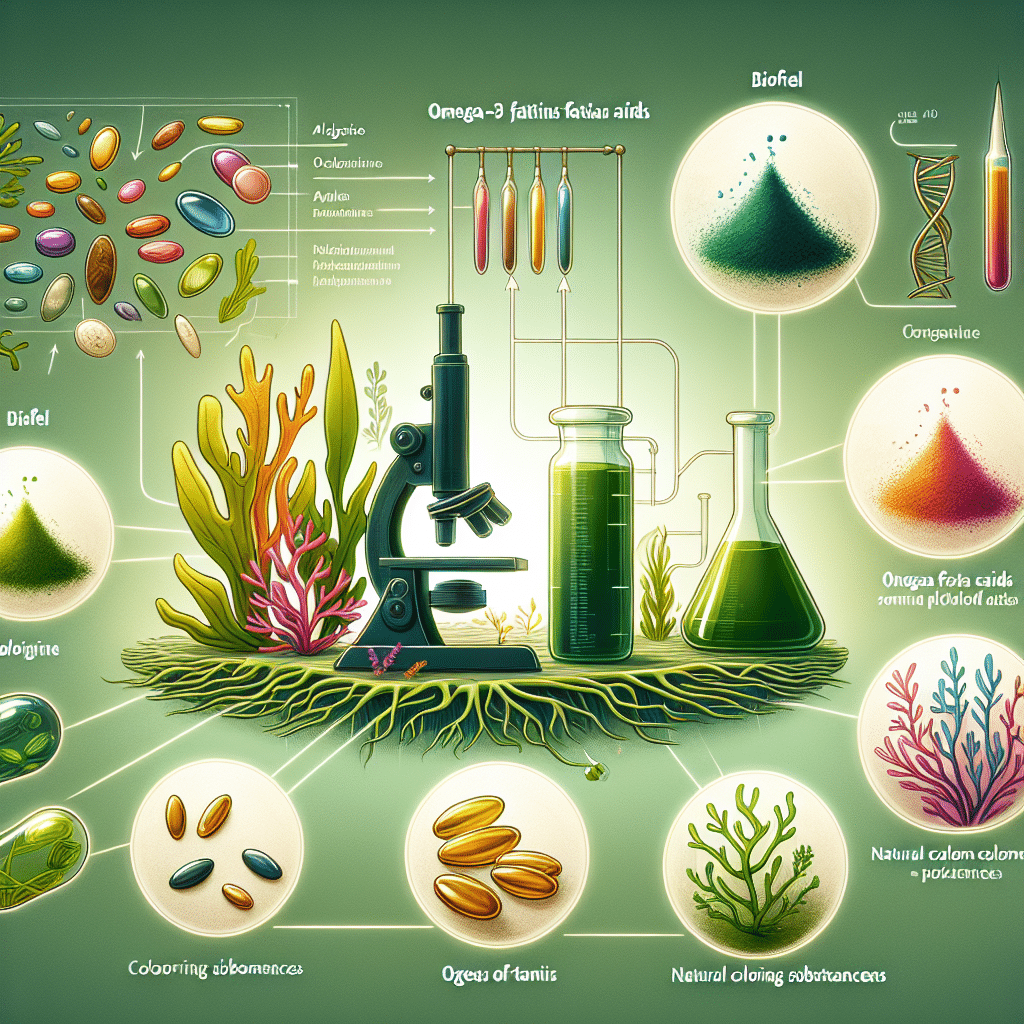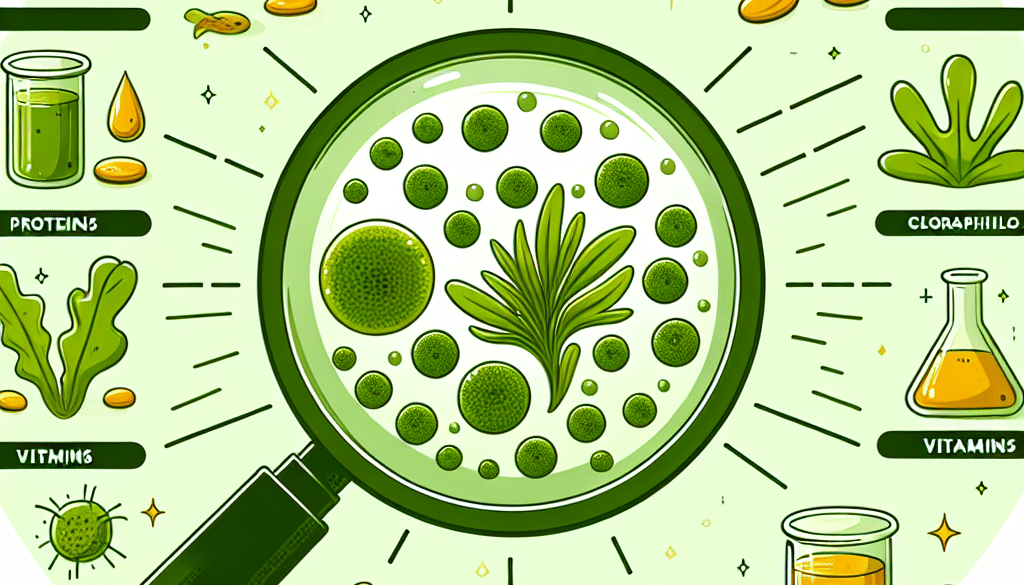What Are Microalgae Rich Sources Of?
-
Table of Contents
- Microalgae: A Treasure Trove of Nutritional Riches
- Understanding Microalgae and Their Environment
- Nutritional Powerhouses: What Microalgae Are Rich In
- Microalgae in Research and Case Studies
- Microalgae and Sustainability
- Commercial Applications and Products
- Challenges and Future Prospects
- Conclusion: Embracing Microalgae for Health and the Environment
- Discover ETprotein’s High-Quality Protein Products
Microalgae: A Treasure Trove of Nutritional Riches

Microalgae, the microscopic cousins of larger seaweeds and kelp, are gaining recognition as a superfood due to their impressive nutritional profile. These tiny photosynthetic organisms are not only a cornerstone of aquatic ecosystems but also a potential solution to some of the world’s most pressing health and environmental challenges. In this article, we will explore the rich sources of nutrients that microalgae offer and how they can benefit human health and sustainability.
Understanding Microalgae and Their Environment
Microalgae are diverse, with thousands of species inhabiting both freshwater and marine environments. They range from single-celled organisms to complex multicellular forms, each with unique properties and potential uses. Microalgae are responsible for producing a significant portion of the Earth’s oxygen and serve as the base of the aquatic food chain.
Nutritional Powerhouses: What Microalgae Are Rich In
Microalgae are a rich source of several essential nutrients, making them an attractive option for dietary supplements and functional foods. Here are some of the key components that microalgae are known for:
- Proteins: Certain microalgae species, such as Spirulina and Chlorella, boast high protein content, with a complete amino acid profile that is highly digestible.
- Omega-3 Fatty Acids: Microalgae are one of the few plant sources of long-chain omega-3 fatty acids, particularly eicosapentaenoic acid (EPA) and docosahexaenoic acid (DHA), which are crucial for brain health and reducing inflammation.
- Antioxidants: Microalgae contain various antioxidants, including beta-carotene, astaxanthin, and phycocyanin, which help protect cells from oxidative stress.
- Vitamins: They are a good source of B-vitamins, including B12, which is often lacking in vegetarian and vegan diets, as well as vitamin E and K.
- Minerals: Microalgae can be rich in minerals such as iron, magnesium, calcium, and zinc, which are vital for numerous bodily functions.
- Pigments: Chlorophyll, the green pigment in microalgae, has been linked to detoxification and digestive health benefits.
Microalgae in Research and Case Studies
Scientific research has begun to uncover the potential health benefits of microalgae. For instance, studies have shown that Spirulina can help manage diabetes, reduce cholesterol, and boost immunity. Another microalga, Chlorella, has been found to aid in detoxification and improve digestive health. The high antioxidant content in microalgae like Haematococcus pluvialis, which produces astaxanthin, has been linked to improved skin health and reduced signs of aging.
Case studies have also demonstrated the scalability of microalgae as a sustainable food source. Companies have successfully cultivated microalgae in controlled environments, using them to create protein powders, omega-3 oils, and natural colorants for the food industry.
Microalgae and Sustainability
Microalgae cultivation has a relatively low environmental footprint compared to traditional agriculture. It requires less land and water and can be grown in areas unsuitable for other crops. Additionally, microalgae can help combat climate change by absorbing carbon dioxide during photosynthesis.
Commercial Applications and Products
The versatility of microalgae has led to their use in a variety of commercial products. Algal-based supplements are available in the form of tablets, powders, and oils. Microalgae are also used in the cosmetics industry for their skin-nourishing properties and as natural colorants in the food industry.
Challenges and Future Prospects
Despite their potential, microalgae face challenges in terms of large-scale production and market acceptance. However, ongoing research and technological advancements are making microalgae cultivation more efficient and cost-effective. As consumer awareness grows, microalgae are poised to become a more prominent part of our diets and a key player in sustainable food production.
Conclusion: Embracing Microalgae for Health and the Environment
Microalgae are a rich source of proteins, omega-3 fatty acids, antioxidants, vitamins, and minerals. Their potential health benefits, coupled with their sustainability credentials, make them an exciting area of interest for nutritionists, environmentalists, and entrepreneurs alike. As research continues to reveal more about these microscopic marvels, microalgae could very well be at the forefront of the next nutritional revolution.
Discover ETprotein’s High-Quality Protein Products
If you’re interested in incorporating high-quality protein into your diet, consider exploring ETprotein’s range of products. ETprotein specializes in organic bulk vegan proteins and L-(+)-Ergothioneine (EGT), offering a variety of protein sources such as rice, pea, and seed-based proteins. Their products are characterized by a neutral taste, non-GMO, and allergen-free attributes, with L-(+)-Ergothioneine purity over 98%, making them suitable for a wide range of industries and dietary preferences.
About ETprotein:
ETprotein, a reputable protein and L-(+)-Ergothioneine (EGT) Chinese factory manufacturer and supplier, is renowned for producing, stocking, exporting, and delivering the highest quality organic bulk vegan proteins and L-(+)-Ergothioneine. They include Organic rice protein, clear rice protein, pea protein, clear pea protein, watermelon seed protein, pumpkin seed protein, sunflower seed protein, mung bean protein, peanut protein, and L-(+)-Ergothioneine EGT Pharmaceutical grade, L-(+)-Ergothioneine EGT food grade, L-(+)-Ergothioneine EGT cosmetic grade, L-(+)-Ergothioneine EGT reference grade and L-(+)-Ergothioneine EGT standard. Their offerings, characterized by a neutral taste, non-GMO, allergen-free attributes, with L-(+)-Ergothioneine purity over 98%, 99%, cater to a diverse range of industries. They serve nutraceutical, pharmaceutical, cosmeceutical, veterinary, as well as food and beverage finished product distributors, traders, and manufacturers across Europe, USA, Canada, Australia, Thailand, Japan, Korea, Brazil, and Chile, among others.
ETprotein specialization includes exporting and delivering tailor-made protein powder and finished nutritional supplements. Their extensive product range covers sectors like Food and Beverage, Sports Nutrition, Weight Management, Dietary Supplements, Health and Wellness Products, and Infant Formula, ensuring comprehensive solutions to meet all your protein needs.
As a trusted company by leading global food and beverage brands and Fortune 500 companies, ETprotein reinforces China’s reputation in the global arena. For more information or to sample their products, please contact them and email sales(at)ETprotein.com today.














